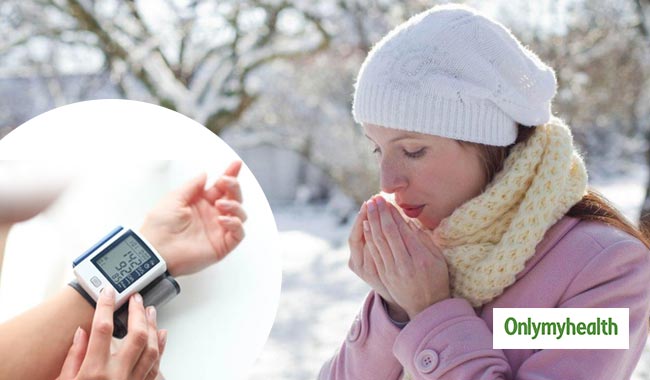
Blood Pressure is a common health issue faced by almost 50% of our population. Most of the cases are of Hypertension (when the blood pressure of individuals is higher than necessary). High Blood Pressure can cause severe afflictions, ranging from heart and kidney failure to damaged arteries and eyes. The most commonly known cause of high Blood Pressure (BP) is food. Consumption of items with high Sodium content, meaning too much Salt, can cause high Blood Pressure. Other lifestyle habits such as smoking, alcohol consumption also contribute to high Blood Pressure. But there is one other cause of Hypertension that is overlooked: Cold climate.

Also read: Know your Blood Pressure Numbers
Winter excites not just the mind but also the body, specifically the Blood Pressure. Research suggests that cooler temperatures can inflict a rise in Blood Pressure, making matters worse for people already affected with the condition; this can result in a stroke or heart attacks. This is not only limited to those patients with a history of high Blood Pressure. Even people with a normal Blood Pressure, ie. a blood pressure lower than 120/80mmHg, can face problems due to cooler temperatures.
Not only the change in temperatures but also the rate of change has an effect on your BP. The faster the changes in temperature, higher the risk of Hypertension. If the weather suddenly cools down, our veins shrink. Narrower veins mean more pressure required to push blood. This may result in increased pressure on the Heart and Veins, causing severe damage to the body. Hence, it is necessary to take extra care during winter. Not just from the cold but also from a possible hypertension incident; elderly people specifically maybe susceptible to temperature problems during this season. Here are a few tips to ensure that your Blood Pressure stays normal:
Monitor your blood pressure: First and foremost, check your BP regularly. An easy test will indicate if you are suffering from Hypertension already or not. With this information, it will be easier to trudge through during winter
Check the salts: Especially if you are a Hypertensive patient, cut down on your salts. Consume a diet rich in nutrients which help lower the pressure; also avoid fats and sugar. Try consuming a lot of whole fruits and juices
Warm up: Not the kind involved in sports. Warm yourself by wearing an extra layer of wool or thermals over your clothes. This will relax your veins, resulting in a normal Blood Pressure. Scarves, caps, gloves etc. are always can help keep the chills away
No smoke policy: If you are a smoker, try to avoid it during the winter. Smoking is already considered a cause for Hypertension and with winter on its side, your Blood Pressure will go up
No drink policy: It may soothe your throat and warm-up your body for a little while during the winter, but it does cause Hypertension. Try to avoid alcohol as much as possible; instead choose hot beverages like Tea, Coffee, etc.

Also read: The 9 biggest myths about alcohol, busted
Controlled physical activity: Continuing to remain fit during this season is a big plus which helps you stay in shape and keeps your Heart healthy. Avoid venturing outdoors early, rather go out when it is a little warmer and sunny.
Inputs by Dr Farah Ingale, Internal Medicine, Hiranandani HospitalVashi - A Fortis Network Hospital.
Read more articles on hypertension.
For more related articles, download OnlymyHealth app.
How we keep this article up to date:
We work with experts and keep a close eye on the latest in health and wellness. Whenever there is a new research or helpful information, we update our articles with accurate and useful advice.
Current Version
